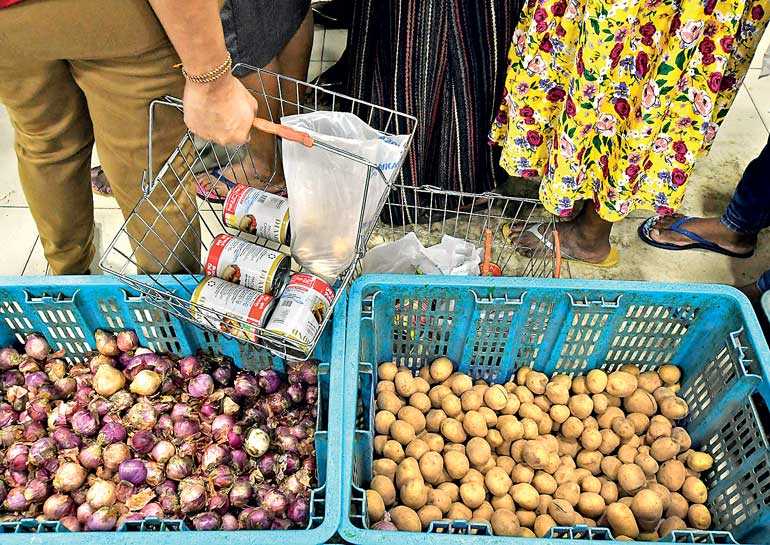Tuesday Feb 17, 2026
Tuesday Feb 17, 2026
Tuesday, 12 May 2020 00:00 - - {{hitsCtrl.values.hits}}

A robust biosecurity framework is important not only to ensure internal food security from extraneous threats but as an enabler of export market access to existing and new markets – Pic by Shehan Gunasekara
Agriculture is a staple of Sri Lanka’s economic and social construct; it is inextricably linked to our past and will be well into the future.
The present circumstances experienced within Sri Lanka due to COVID-19 should place the agriculture sector at the forefront of policymakers’ minds, particularly in ensuring food security for the nation’s population. This however brings to light the rather weak biosecurity framework employed by Sri Lanka in protection of this sector.
According to the current World Bank and Government of Sri Lanka statistics approximately 43% of Sri Lanka’s landmass is consumed by agricultural land with 81% of the total population living within rural communities. Agriculture contributes 7% of GDP, accounts for over 17% of exports and employs at minimum 27% of females and 23% of males or a combined 24%. 
Whilst the overall contribution to GDP may be low due to the type of commodities produced, food production has been on the rise and will most likely continue to do so. Noteworthy is Sri Lanka’s self-sufficiency across multiple commodities with approximately 80% of domestic food consumption being derived through domestic production, which is a positive for food
security.
Whilst admitting that I have not done any detailed review of the literature, what I have found focuses mainly on the economics, from opening up new export markets to value addition, subsidies and mechanisation of production, all very much required to ensure a vibrant agriculture
sector.
However little attention seems to be paid to the important aspect of biosecurity. Biosecurity within agriculture is not simply about prevention, response and recovery from pests and disease within the sector but also the impact it has on the broader economy and environment.
As an annual visitor to Sri Lanka I am always amazed at how lax the biosecurity controls are at the airport and I’m assuming similar at seaports. I cannot recall ever seeing any question on the immigration entry forms for declarations related to bringing in food or plant material, etc., or any active or passive monitoring for that matter that we do for example in Australia. Maybe the simple fact that it is only an immigration declaration rather than a joint immigration and quarantine declaration is the problem.
Whilst this is only one example of where a threat could originate from it is a serious gap and a clear indicator of the lack of understanding across the community of the significant fallout that could occur to the nation’s food security and overall economic health were there to be a major biosecurity outbreak within the agriculture sector. It is not often what you can see that will end up getting you, rather the unseen as is currently being experienced, which is why it is imperative that agriculture biosecurity be placed at the forefront of decision making.
Sri Lanka is not immune to these incidents with the decimation of the coffee industry in the early 19th century being one such example and I am sure there are many other incidents that have gone unreported or unpublicised. With the increased movement of people and commerce, the threat level also increases and if left unchecked will create serious problems that Sri Lanka is simply not prepared for.
This gap must be addressed immediately through the introduction of robust biosecurity policy and programs supported by sound regulation, education, and enforcement by the government across the entire biosecurity continuum.
Sri Lanka’s draft Overarching Agriculture Policy makes no mention of biosecurity, although some mention is made of the impact of pests. Producers should not be solely responsible for what is in the national interest, nor should it be government. A partnership between all the players and government is key to the success of any biosecurity framework, but Government must take the lead role.
A robust biosecurity framework is important not only to ensure internal food security from extraneous threats but as an enabler of export market access to existing and new markets. Sanitary and phytosanitary requirements across the world are growing and this can be supported by a robust biosecurity framework. In Australia this is a serious consideration and Australia is well known for its strong biosecurity credentials, a reason why regardless of costs, markets exist.
If Sri Lanka is to ensure food security and continue to improve its economic credentials by moving to a knowledge based, export oriented economy, including seriously increasing the impact of the agriculture sector, then immediate steps must be taken to introduce a robust biosecurity framework.
(The writer resides in Australia and has been involved in rural and regional development for close to a decade. He has more than a fleeting interest in the agriculture sector having held agriculture focussed senior executive roles with the New South Wales State Government, as CEO of Northern Territory Farmers Association and via appointment to various Government advisory boards. He is currently CEO of the Australian Science Teachers Association.)